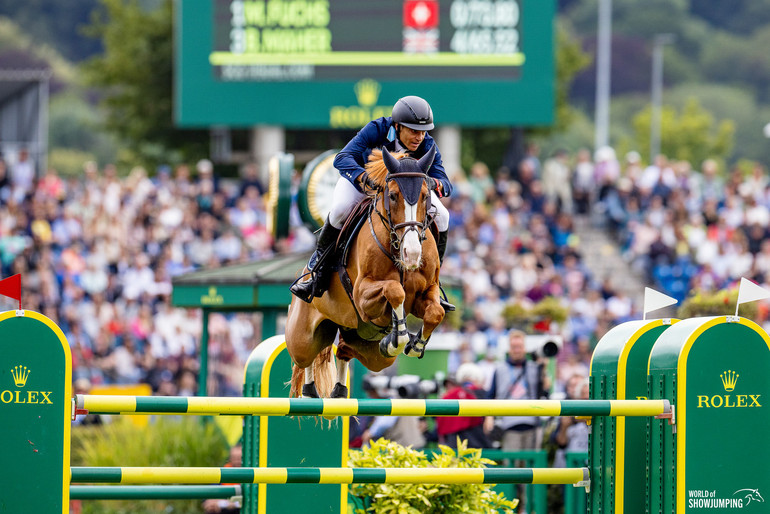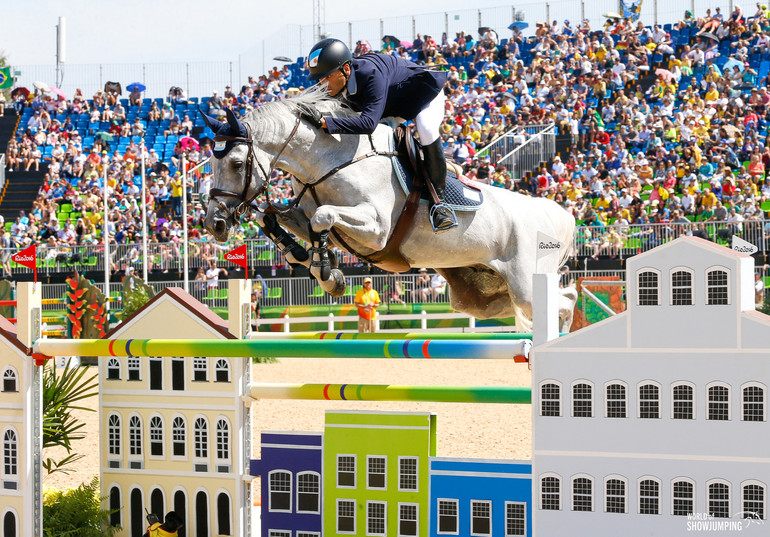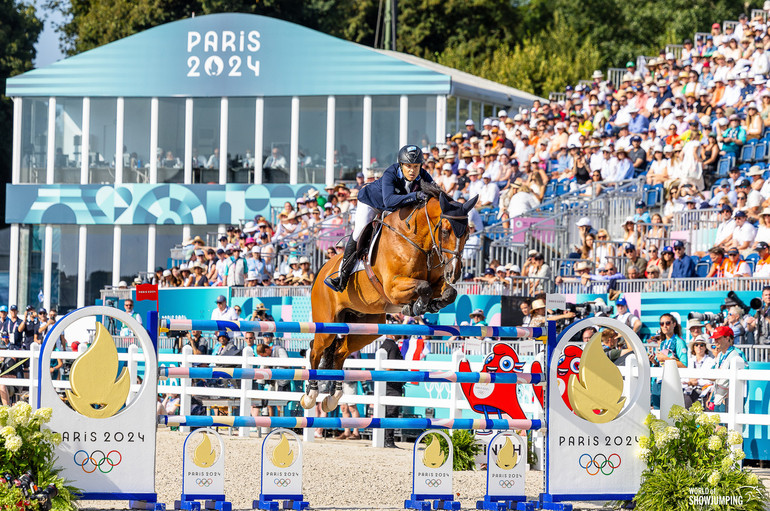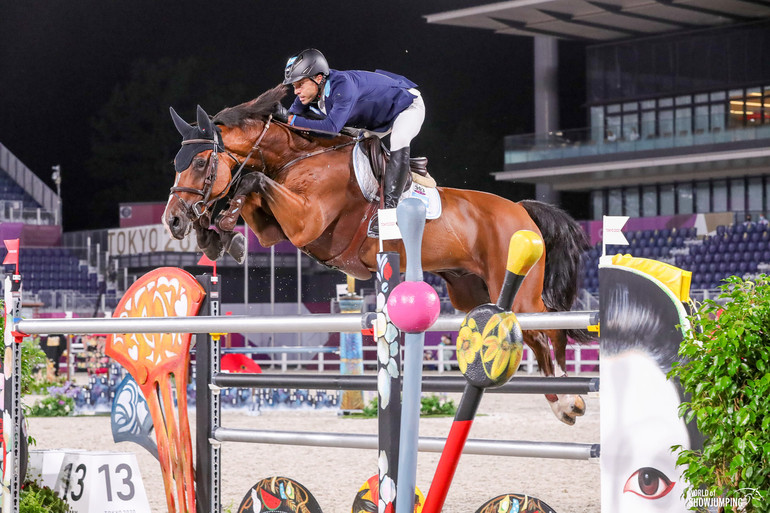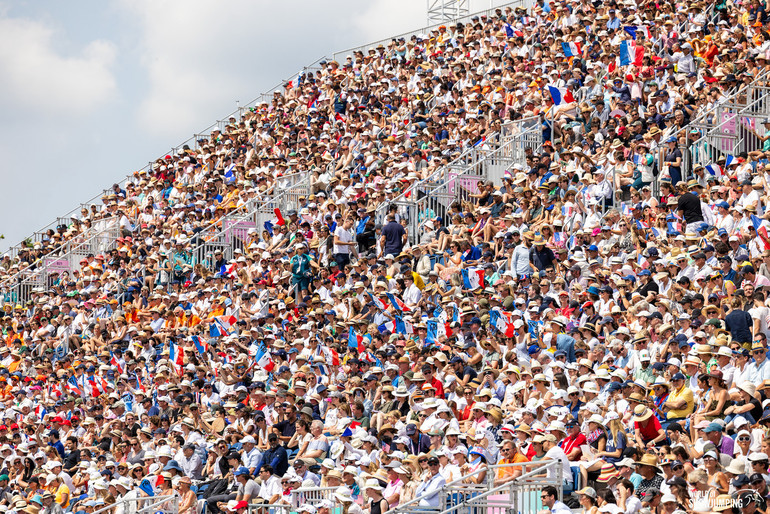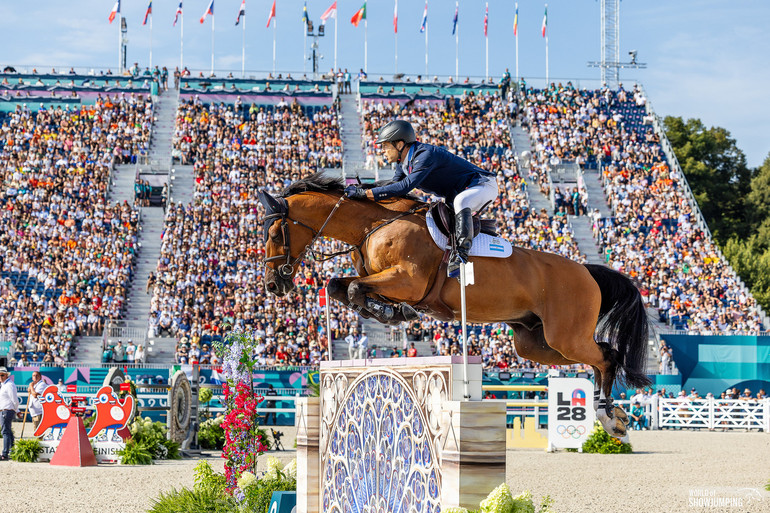 “My horse Finn Lente knows that I am not a perfect rider, but he trusts me and our close relationship allows me to compete at the highest level. Our success is not down to me being the best rider, but rather to us having one of the best partnerships," José Maria Larocca tells World of Showjumping. All photos © Jenny Abrahamsson for World of Showjumping.
“My horse Finn Lente knows that I am not a perfect rider, but he trusts me and our close relationship allows me to compete at the highest level. Our success is not down to me being the best rider, but rather to us having one of the best partnerships," José Maria Larocca tells World of Showjumping. All photos © Jenny Abrahamsson for World of Showjumping.
Text © World of Showjumping
“That's the beauty of our sport; when you build a relationship of trust with your horse, you can achieve things that might have seemed unthinkable to begin with,” Argentina’s José Maria Larocca Jr. tells World of Showjumping about his journey to the top of the sport. “My horse Finn Lente knows that I am not a perfect rider, but he trusts me and our close relationship allows me to compete at the highest level. Our success is not down to me being the best rider, but rather to us having one of the best partnerships.”
Larocca, who moved to London in 1994 due to his work in trading commodities, rekindled his love for horses in 2003 and got back in the saddle at the age of 34 after having learned the basics in his native Argentina. Fast forward two decades, and Larocca has competed at five Olympic Games, three World Equestrian Games and four Pan American Games – claiming team silver in Toronto in 2015 with Cornet du Lys (Cornet Obolensky x Champion du Lys) and individual silver in Lima in 2019 with Finn Lente (Gaillard de la Pomme x Colandro). Currently 212th on the Longines Ranking, Larocca took the biggest victory of his career when topping the CSI5* 1.60m Rolex Grand Prix in Brussels, Belgium, in the beginning of September.
From the bottom up
Today, Larocca can enjoy the sport with his children; his son Matias rode alongside him on the Argentinian team at the 2022 World Championships in Herning, Denmark. “This is one of the things that attracts me more than ever to this sport; being able to share it with my family. I have two daughters and they also love the sport very, very much. It's beautiful to share it with them,” he says.
It's the relationship that you need with the horse that drew me in, that is what I love the most about this sport
Larocca keeps his horses in France, close to the Swiss border. “At the moment I have six horses, while my son has four and one of my daughters has three,” he tells. “I started riding when I was very young, following in my father's footsteps. My uncle used to jump on a high level as well, so the sport runs in the family! However, I was without riding at all for about ten years; I did not sit on a horse, even though I always wanted to ride because it is my passion. In 2003, I got back in the saddle, but I had never jumped more than 1.40m in Argentina. It's the relationship that you need with the horse that drew me in, that is what I love the most about this sport.”
“I really started from the bottom when I got back in the saddle,” Larocca continues. “At my first show back, a national 1.20m class, I was eliminated on the second fence. I underestimated how much I had forgotten. My trainer at the time – Ivan Camargo – was very optimistic, a bit crazy like me, and we dreamt together. I did my first international show in 2004 and then we started imagining; where can we get in one or two years? I think that in 2005 we were already talking about the World Games! We started dreaming, pushing and putting a lot of effort in, and eventually we made it to the World Equestrian Games in 2006.”
I really started from the bottom when I got back in the saddle
“I learned a lot there and afterwards, I got hold of the first horse that took me to a level where I could compete without being embarrassed about the results. With Royal Power, I started going clear in five-star Grand Prix classes and I did my first Olympics together with him in 2008. He was really an exceptional horse, a little bit crazy, but I needed a crazy horse to be able to do these things because I was really not riding very well. I still have him in Argentina, and I visit him every year. I love this horse so, so much. I bought his mother and I have a few siblings of him as well.”
“Due to my work, I have only been able to ride during the weekends, but as I am getting retired this autumn, I hope to be spending more time with the horses,” the 55-year-old tells.
Exceptional horses
Larocca has recorded his biggest achievements to date with the now 14-year-old gelding Finn Lente. “He is exceptional,” Larocca says. “I'm not one of these top riders like Steve Guerdat. I think Finn Lente has everything you can dream of; he has a heart of a lion, all the scope, he is super careful, easy to ride and very healthy. He is a horse that anybody would like to have in their stables, he would be ideal for anybody who wants to jump on the top level. He is not difficult; he is simply very straightforward.”
Finn Lente has everything you can dream of
“I bought Finn Lente from Stephan Conter and Manuel Fernandez Saro was riding him at the time,” Larocca continues. “Fanfa had been riding Finn Lente for about a year, and he told me that he really liked the horse and thought we could be a perfect match. When Finn Lente was turning eight, I decided to buy him, but I left him with Fanfa for six months before I started riding him.”
“Cornet du Lys was exceptional as well,” Larocca says about another superstar he has had the pleasure of riding. “I bought him as a 6-year-old from Ludger Beerbaum. Henrik von Eckermann, who at the time was working for Ludger, continued riding him and the horse started doing better and better. I started riding him in the middle of his seventh year. He was a little bit too careful for me, especially at that stage of my life, but he did exceptionally good things for me. I won my first four-star Grand Prix with him, and we took team silver at the Pan American Games in 2015. He had 10 out of 10 quality, all the scope and his elasticity was incredible. He gave me a lot, and I have a few of his offspring.”
Well worth the effort
Getting back in the saddle at 34 and finding his place at the very top of the sport has taught Larocca some huge lessons along the way. “First of all, what I have learned is that you have to think long-term – because short-term plans do not work in this sport,” he tells. “Secondly, be realistic; you have to be conscious of your strengths and weaknesses. It's not easy, but you need to understand where are you coming from. It's a sport that requires a lot of mental strength, because there are many bad days. However, it's well worth all the frustrations that we live through because it's so rewarding when things go well.”
At the end of the day, it depends on how much you love the sport, how much you love the horses and how passionate you are
“Especially the first year was very, very tough. At the end of the day, it depends on how much you love the sport, how much you love the horses and how passionate you are. Your passion will get you over the frustration and the difficult moments. For me it was always worth the effort, because the reward was spending time with the horses – and that is what I enjoy the most.”
Alongside horses, health is another obsession for Larocca. “Health is the basis of life and I exercise a lot. I want to encourage everybody to be as healthy as possible. I am a firm believer that we need to look after our own health first to be able to help anybody else,” he says.
Small showjumping nation, big goals
For 2025, Larocca would like to see more Argentinian riders competing in Europe. “In Argentina, the sport has not progressed as much as it has in Europe. We have the culture, but it's much smaller, and it's very difficult to organize international competitions because everything is far apart,” he tells. “I'm now trying to rally the riders from Argentina to come over so we can try to get some invitations for the big Nations Cups. We have riders not only in Argentina but in Mexico and the USA as well. I am trying to get all of them to come over to Europe next year, because I think it would be beneficial for our progress in the sport to compete together. Our next big championships will be the World Equestrian Games in Aachen in 2026, the 2027 Pan American Games in Lima and then the Olympic Games in Los Angeles in 2028 – those are the next big goals.”
We have the culture, but it's much smaller
“I'm also putting effort into the breeding in Argentina, because I believe that the sport starts with the breeding. Three of the six horses me and my son competed with in Brussels were bred in Argentina, which I love. The breeding is improving and increasing in Argentina and I believe we can build on that,” Larocca says.
No public, no sport
During his career, Larocca has competed at five Olympic Games, including the 2024 Games in Paris. “The Olympics are very special occasions,” he tells. “It is a dream for any athlete, to get a medal and honour your country at the Olympic Games. It is important that our sport remains inside the Olympic movement, because it motivates a lot of people, including sponsors and the general public. I believe that we have to keep our sport as entertaining as possible and simple and easy to understand for the wider audience. I am in favour of the new Olympic format, I think it is the way forward. We need to be very mindful of the public, because at the end of the day, when there is no public, there is no sport.”
Every party involved in this sport has to be mindful of the impact their behaviour has on the sport as a whole
“We are dealing with animals, and this is a sensitive matter,” Larocca continues. “It is what makes us unique as a sport, but it can also be seen as a weakness, due to the many opinions out there when it comes to horse welfare. However, I think our place in the Olympic movement is down to us, not to anyone else. Yes, there will always be people wanting to push us out, but ultimately, it all depends on how we behave. Every party involved in this sport has to be mindful of the impact their behaviour has on the sport as a whole. I think people are becoming more aware and more conscious and now everybody is making an effort. It's our responsibility. There are many stakeholders, but riders are the main responsible stakeholders in making sure that the sport is well looked after. As the only sport where men and women compete as equals, equestrianism is truly unique. This sport is our passion, and we have to defend it.”
24.9.2024 No reproduction of any of the content in this article will be accepted without a written permission, all rights reserved © World of Showjumping.com. If copyright violations occur, a penalty fee will apply.



